
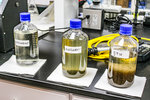
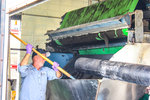
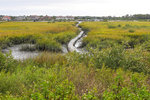
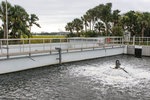

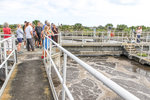
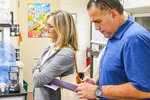
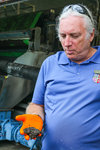
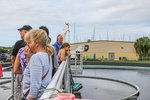
On an overcast October day, City of St. Augustine Waste Water Treatment Plant Supervisor Stephen Curmode guided 14 guests on the first of two facility tours during Florida City Government Week, Oct. 21 – 27. The tours were sponsored by the Florida League of Cities to raise awareness about the importance of municipal government and its daily impact on residents.
The City’s Public Information Coordinator, Melissa Wissel, said letting residents know about the hardening of the facility was a focus because its location is vulnerable to floods, storms and hurricanes. Wissel had toured the plant in her role as a City employee and told attendees, “You will never flush your toilet the same.”
Curmode is passionate about waste water treatment, having worked for nearly 30 years at a facility in Dade County where Hurricane Andrew wreaked havoc in 1992. He brings valuable experience to the local facility in best practices to harden the infrastructure. He wants people to know that if a storm causes power outages, pumping stations do not function. Residents who choose to hunker down for a storm should refrain from flushing until power is restored because without pumping stations, there is nowhere for the water to go and it backs up.
There are more than 140 miles of piping in the City’s collection system as far north as the Northeast Florida Regional Airport, west to State Road 16, south to about Vaill Point Road and east to include Davis Shores. All waste water treatment systems are designed to treat what goes down the drains in the kitchen and bathroom sink, toilet, shower and tub. But just because a product is labeled “flushable” doesn’t mean it belongs in the system.
Baby wipes and other so-called flushable wipes can clog the system, and, if the clog is located in the pipe between the home and the street, the homeowner bears the cost of the repair. Other items that do not belong in the drain are cotton pads, swabs or balls, paper towels, diapers, condoms, feminine products, hazardous chemicals, hair, medicines, cloth, facial tissues and cat litter.
Fats, oils and grease also cause clogs. One of the ladies on the tour asked if running hot water and dish soap down the drain with fat or grease from cooking would help. Curmode said it would likely just cause a clog farther down the line.
He recommended discarding used fat, oil or grease into a can or jar that is kept in the refrigerator until it’s solid, then placing it in the trash. Used cooking oil is collected throughout the year at the City’s Wastewater Treatment Facility at 501 Riberia Street in St. Augustine.
The annual after-the-holidays used cooking oil collection event will be presented by the City of St. Augustine and St. Johns County Utilities in partnership with St. Johns Technical High School Academy of Coastal & Water Resources from 7:30 a.m. to 2:30 p.m. Friday, Jan. 3 at Francis Field, 25 West Castillo Drive, and behind the St. Johns County Parks and Recreation office, 840 West 16th Street. Participants are asked to allow the used oil to cool before collecting it at home and delivering it in a safe, sealed container. In addition to cooking oil, holiday lights, batteries and electronic devices will be accepted.
While there is a long list of what not to put down the drain, there are very few items that belong in the sewer system: fecal matter (also known as No. 2), urine (No. 1), food waste through a garbage disposal and toilet paper. But not all toilet paper breaks down at the same rate, according to Curmode.
“My personal preference is for everyone to use RV toilet paper,” Curmode said. “It breaks down a lot quicker.”